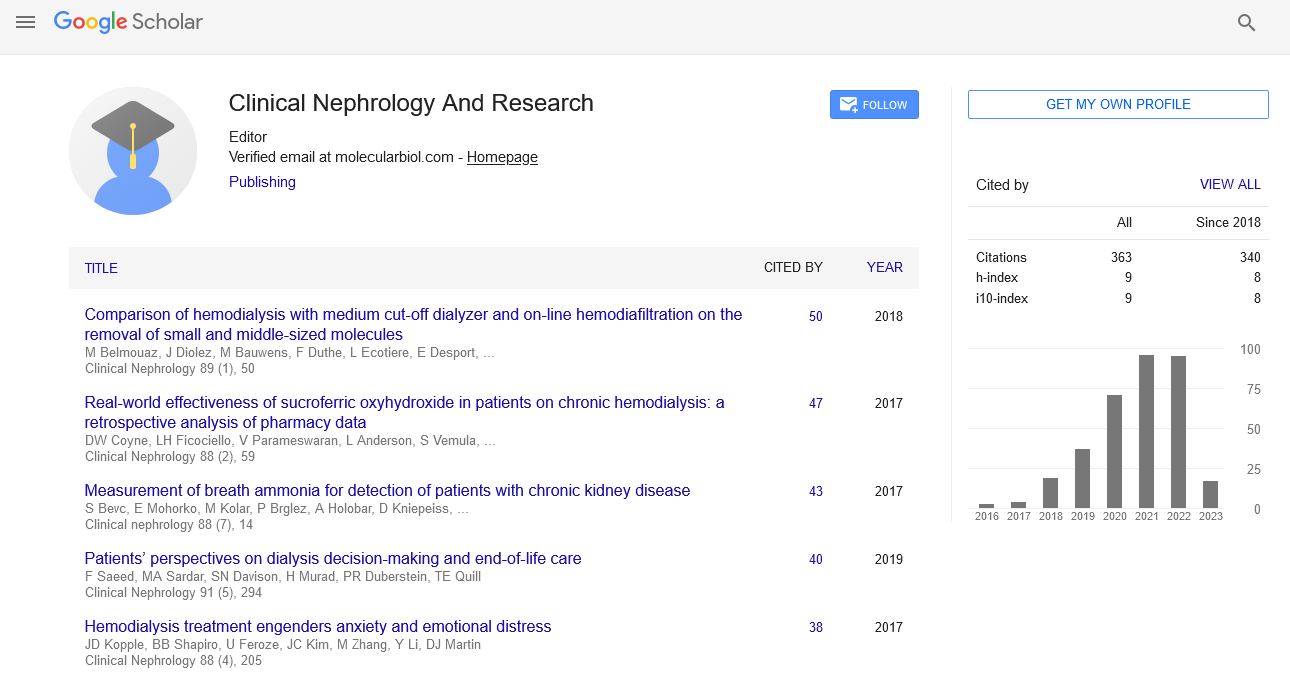Renal Dysfunction
A condition in which the kidneys fail to work and cannot remove waste and excess water from the blood, or maintain a balance between chemicals in the body. Acute or serious renal failure occurs spontaneously (e.g., after an injury) and may be treated and healed. Chronic renal failure can be caused by conditions like high blood pressure or diabetes for many years, and cannot be healed. Chronic renal failure, known as end-stage renal disease (ESRD), may lead to complete renal failure and long-term failure. An individual in ESRD requires dialysis (the cycle to clean the blood by going through a membrane or filter) or kidney transplant. This is also known as Renal Dysfunction.
High Impact List of Articles
-
Market Analysis of 20th Annual Conference on Nephrology and
Urology
Behzad SaberiEditorial: Clinical Nephrology and Research
-
Market Analysis of 20th Annual Conference on Nephrology and
Urology
Behzad SaberiEditorial: Clinical Nephrology and Research
-
Clinico-pathological features and predictors of End-Stage Renal Disease
(ESRD) in C3 glomerulopathy: A retrospective study
Priti Meena MD, Vinant Bhargava DNB MNAMS, Pallav Gupta MD, Rana DS DNB, MNAMS, Bhalla AK, DM, Ashwni Gupta DM, Anurag Gupta MD, Manish Malik DNB, MNAMSResearch Article: Clinical Nephrology and Research
-
Clinico-pathological features and predictors of End-Stage Renal Disease
(ESRD) in C3 glomerulopathy: A retrospective study
Priti Meena MD, Vinant Bhargava DNB MNAMS, Pallav Gupta MD, Rana DS DNB, MNAMS, Bhalla AK, DM, Ashwni Gupta DM, Anurag Gupta MD, Manish Malik DNB, MNAMSResearch Article: Clinical Nephrology and Research
-
Photo Quiz: Purple Urine Bag Syndrome
Chinmay Patel M.D. FASN*, Kevin Farthing DO and Tiffany Salyers DOCommentary: Clinical Nephrology and Research
-
Photo Quiz: Purple Urine Bag Syndrome
Chinmay Patel M.D. FASN*, Kevin Farthing DO and Tiffany Salyers DOCommentary: Clinical Nephrology and Research
-
The role of point of care ultrasonography
Alfredo Peguero*, Jorge Lamarche, Craig Courville, Mohamed Taha, Marina Shultz-Antar and Andres ReyesReviews: Clinical Nephrology and Research
-
The role of point of care ultrasonography
Alfredo Peguero*, Jorge Lamarche, Craig Courville, Mohamed Taha, Marina Shultz-Antar and Andres ReyesReviews: Clinical Nephrology and Research
-
Association of high serum triglycerides and triglycerides/ HDL ratio with raised HbA1c, creatinine, microalbuminuria and development of diabetic kidney disease and diabetic renal failure. Mathematical and statistical regression models of 10,370 diabetic patients
Kamran Mahmood Ahmed Aziz*Original Article: Clinical Nephrology and Research
-
Association of high serum triglycerides and triglycerides/ HDL ratio with raised HbA1c, creatinine, microalbuminuria and development of diabetic kidney disease and diabetic renal failure. Mathematical and statistical regression models of 10,370 diabetic patients
Kamran Mahmood Ahmed Aziz*Original Article: Clinical Nephrology and Research
Conference Proceedings
-
Upper gastrointestinal bleeding in end-stage renal dialysis patients with chronic liver disease
Chia-Ling Wang and Chih-Chiang ChienPosters & Accepted Abstracts: Journal of Clinical Diagnosis and Treatment
-
Upper gastrointestinal bleeding in end-stage renal dialysis patients with chronic liver disease
Chia-Ling Wang and Chih-Chiang ChienPosters & Accepted Abstracts: Journal of Clinical Diagnosis and Treatment
-
Real-world evidence: The public health perspective for chronic diseases
Marina KomaroffPosters & Accepted Abstracts: Journal of Clinical Diagnosis and Treatment
-
Real-world evidence: The public health perspective for chronic diseases
Marina KomaroffPosters & Accepted Abstracts: Journal of Clinical Diagnosis and Treatment
-
Analysis of the effect of nine consecutive year’s intensive management and number of achieving the target control on endpoint events in T2DM in Sanlitun Community Health Service Center in Beijing
Xue-Lian Zhang,Shen-Yuan YUAN ,Chen-Mei ZHAO, Gang WAN, Ming-Xia YUAN, Guang-Ran YANG, Han-Jing FU, Liang-Xiang ZHU, Rong-Rong XIE, Xue-Li CUI, and Shen-Yuan YUANScientificTracks Abstracts: Journal of Clinical Diagnosis and Treatment
-
Analysis of the effect of nine consecutive year’s intensive management and number of achieving the target control on endpoint events in T2DM in Sanlitun Community Health Service Center in Beijing
Xue-Lian Zhang,Shen-Yuan YUAN ,Chen-Mei ZHAO, Gang WAN, Ming-Xia YUAN, Guang-Ran YANG, Han-Jing FU, Liang-Xiang ZHU, Rong-Rong XIE, Xue-Li CUI, and Shen-Yuan YUANScientificTracks Abstracts: Journal of Clinical Diagnosis and Treatment
-
Central obesity and its implicated adverse health conditions are a major concern of some people
Iwezu Happy NonsoScientificTracks Abstracts: Clinical Cardiology Journal
-
Central obesity and its implicated adverse health conditions are a major concern of some people
Iwezu Happy NonsoScientificTracks Abstracts: Clinical Cardiology Journal
-
The epidemiological shift and current economic environment warrant new approaches to the treatment of risk factors for cardiovascular disease
Alfred SparmanKeynote: Clinical Cardiology Journal
-
The epidemiological shift and current economic environment warrant new approaches to the treatment of risk factors for cardiovascular disease
Alfred SparmanKeynote: Clinical Cardiology Journal




